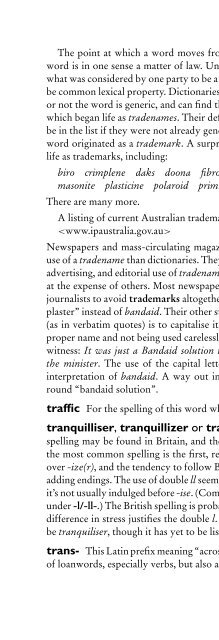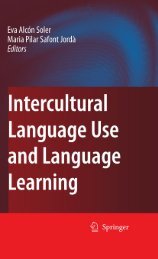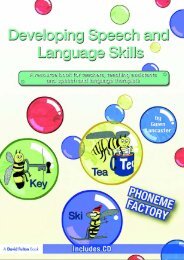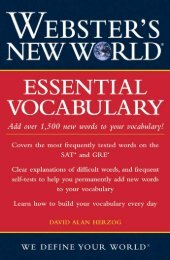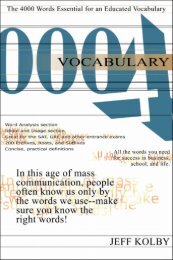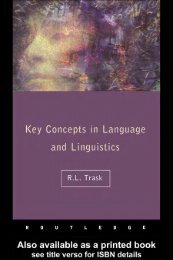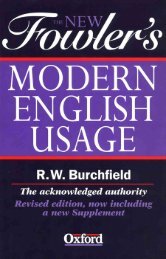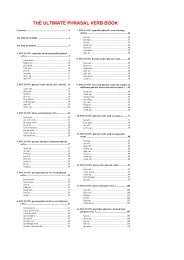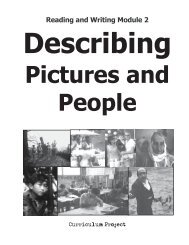- Page 2:
This page intentionally left blank
- Page 8:
The Cambridge Guide to Australian E
- Page 12:
Contents Preface to The Cambridge G
- Page 20:
Preface to The Cambridge Australian
- Page 24:
Preface to the First Edition option
- Page 30:
Foreword to the First Edition The
- Page 34:
Overview of Contents and How to Acc
- Page 40:
A @ The “at sign” is a new recr
- Page 44:
As the list shows, the form an- occ
- Page 48:
abbreviations à la carte method co
- Page 52:
abbreviations Option (c). According
- Page 56:
Aboriginal or Aborigine ablative Th
- Page 60:
absolute use—Pintupi or Bindubi
- Page 64:
accommodate English spelling does w
- Page 68:
acronyms acknowledgement or acknowl
- Page 72:
ad lib Webster’s English Usage (1
- Page 76:
adjectives words: see further under
- Page 80:
adjectives 2 Comparison of adjectiv
- Page 84:
adverbs (hedge words/downtoners) fa
- Page 88:
ae/e With -ise spellings prevailing
- Page 92:
-age surviving and remains producti
- Page 96:
aging or ageing (= familiar), and o
- Page 100:
agreement either neither none no-on
- Page 104:
Note that a few collective nouns al
- Page 108:
alias Some of the earliest examples
- Page 112:
alphabets Letter by letter Word by
- Page 116:
aluminium or aluminum and Hyde. For
- Page 120:
America Inevitably perhaps the word
- Page 124:
americanisation During the nineteen
- Page 128:
preferred by the Australian Oxford
- Page 132:
-ance/-ence analogue or analog The
- Page 136:
and/or and The word and is the comm
- Page 140:
antipodes to refer to the region ar
- Page 144:
apostrophe All pairs of antonyms ha
- Page 148:
apostrophes they end in an s or not
- Page 152:
apposition The “Apostrophe Man”
- Page 156:
arch-/archa-/archae-/arche-/archian
- Page 160:
armor or armour Argentinean serve a
- Page 164:
artifact or artefact The prime func
- Page 168:
Asian or Asiatic conservatory depos
- Page 172:
asterisk bodies. But life insurance
- Page 176:
-ation All those have Latin stems.
- Page 180:
audiovisual and electronic media ca
- Page 184:
augur or auger —Australian Copyri
- Page 188:
Australian English commented on, fo
- Page 192:
auxiliary verbs names Australian Fo
- Page 196:
axis To these may be added a number
- Page 200:
B bacillus For the plural of this w
- Page 204:
ail or bale In more formal contexts
- Page 208:
athe or bath Fowler about matters o
- Page 212:
edevil The most essential role of b
- Page 216:
ête noire is a single species of h
- Page 220:
iannual or biennial Some grammarian
- Page 224:
ibliographies —MacLagan, M. and G
- Page 228:
illion the zero plural or the regul
- Page 232:
lond or blonde blanch or blench Bot
- Page 236:
orn or borne bon vivant or bon vive
- Page 240:
ackets one has to allow a plus or m
- Page 244:
each, breech or broach Note the abs
- Page 248:
British English may be offensive. I
- Page 252:
urst bureau For the plural of this
- Page 256:
y, by-, bye- and bye of the ordinar
- Page 260:
C c. or ca. See under circa. -c/-ck
- Page 264:
calendar or calender Caesars, or to
- Page 268:
Canadian English The most frequent
- Page 272:
canvas or canvass of the rod is the
- Page 276:
capital letters In English there’
- Page 280:
capital letters Boxing Day Melbourn
- Page 284:
cappuccino Note that some kinds of
- Page 288:
cases carcass or carcase For many p
- Page 292:
catenatives cataclysm catalepsy cat
- Page 296:
-ce/-ge 2 Calk is the primary spell
- Page 300:
Celtic or Keltic This helps to expl
- Page 304:
ceremonial or ceremonious centum, m
- Page 308:
chalky or chalkie Others feel that
- Page 312:
chevron soldier of Napoleon I whose
- Page 316:
chiseled or chiselled dialect, but
- Page 320:
civil or civic circa This prefix me
- Page 324:
clauses clauses The clause is the b
- Page 328:
cleft sentences She would succeed b
- Page 332:
climax The advice of Spike Milligan
- Page 336:
cocotte or coquette bookie cozzie f
- Page 340:
coherence or cohesion, coherent or
- Page 344:
collocation and collocations Collec
- Page 348:
Colombia or Columbia to detail some
- Page 352:
comma A comma following after will
- Page 356:
common or mutual Yet commentate is
- Page 360:
competence or competency rather tha
- Page 364:
compos mentis apply it to any item
- Page 368:
comprise or composed of comprehensi
- Page 372:
conjugations The abbreviation condo
- Page 376:
conjunctions and conjuncts 2 The su
- Page 380:
consist of or consist in The exampl
- Page 384:
continuance, continuation or contin
- Page 388:
contractions Manual of Style (2003)
- Page 392:
corps, corpse or corpus The complem
- Page 396:
could or might referred to in Ameri
- Page 400:
countercertain intervals. And couns
- Page 404:
credulity or credibility Having sai
- Page 408:
crueler or crueller, cruelest or cr
- Page 412:
cupfuls or cupsful cui bono This ra
- Page 416:
cyclone, hurricane, tornado, typhoo
- Page 420:
Czechoslovakia czarina tsarina (ter
- Page 424:
dangling participles Technically th
- Page 428:
dashes length of an m, and the shor
- Page 432:
dates Use of the cardinal 11 rather
- Page 436:
dative Two other secular systems of
- Page 440:
de mortuis many people it’s the d
- Page 444:
declarative d.s.p. It confirms the
- Page 448:
deduction One of the best known for
- Page 452:
delusion or illusion deixis Borrowe
- Page 456:
deposit dependence or dependency Wh
- Page 460:
despatch or dispatch descriptive or
- Page 464:
diadevil’s advocate This phrase i
- Page 468:
dieresis for example, Australians s
- Page 472:
dike or dyke of ACE. This is in kee
- Page 476:
direct speech seem pretentious for
- Page 480:
discourse markers individuals with
- Page 484:
dispassionate the loss of civil or
- Page 488:
distract or detract dissimilate or
- Page 492:
dolce vita Ditto marks were origina
- Page 496:
doubling of final consonant Only on
- Page 500:
draft or draught examples of the co
- Page 504:
dwelt or dwelled d.t.’s or DT’s
- Page 508:
E -e The letter e is the most hard-
- Page 512:
-eable Other spelling conventions o
- Page 516:
-eau side of a building, and wildfl
- Page 520:
different perspectives are not alwa
- Page 524:
-eer and English. Many of the words
- Page 528:
elder or older The punctuation befo
- Page 532:
ellipsis which is mournful or conte
- Page 536:
else sentences, and four dots (coun
- Page 540:
emigrant, émigré or expatriate
- Page 544:
is of course gender-free, as in man
- Page 548:
English or Englishes enameled or en
- Page 552:
enormity or enormousness tendency t
- Page 556:
epiensure or insure See insure. ent
- Page 560:
equable or equitable Note that epon
- Page 564:
-er/-or *attester or attestor attra
- Page 568:
escapee or escaper Wax melts under
- Page 572:
-ess especially or specially See sp
- Page 576:
etc. This abbreviation is usually w
- Page 580:
Undergraduette had some vogue in Br
- Page 584:
even quid becomes a sausage short o
- Page 588:
ex offico evoke or invoke There are
- Page 592:
exclamation marks exceptional or ex
- Page 596:
expediency or expedience What a way
- Page 600:
eyrie or aerie The extra of common
- Page 604:
factious, factitious or fractious B
- Page 608:
fallacies to a few fixed collocatio
- Page 612:
father-in-law c) damning the origin
- Page 616:
female or feminine government, the
- Page 620:
fetus or foetus it meant “stinkin
- Page 624:
figures of speech in print than the
- Page 628:
finite verbs from being an adjectiv
- Page 632:
Fitzat the Right Time (1985). There
- Page 636:
flash language flamingo For the plu
- Page 640:
flora and fauna the Macquarie Dicti
- Page 644:
folk etymology flutist or flautist
- Page 648:
force de frappe for While this is o
- Page 652:
former and latter foreign names For
- Page 656:
forms of address Dame for women wh
- Page 660:
-free four-letter words This is a c
- Page 664:
fulcrum In Australia the only term
- Page 668:
furor or furore giving people’s i
- Page 672:
e going to be to be about to be on
- Page 676:
garrote, garrotte or garotte link b
- Page 680:
gender it’s potentially a comment
- Page 684:
genteelism Note however that a geni
- Page 688:
geographical names 2 Abbreviating g
- Page 692:
gerunds and gerundives The first wa
- Page 696:
at large. But for Americans and som
- Page 700:
Note that jive with is also used wi
- Page 704:
goodbye or goodby unit from Cambria
- Page 708:
graffiti should not make too much p
- Page 712:
Greek or Grecian “grand prix” f
- Page 716:
ground or grounds nineteenth centur
- Page 720:
guesstimate or guestimate In Austra
- Page 724:
H habeas corpus This somewhat obscu
- Page 728:
half-title half-baked half-cocked h
- Page 732:
hapax legomena in research reported
- Page 736:
haute or haut harebrained or hairbr
- Page 740:
he and/or she Note that in had have
- Page 744:
heading, headline or header 8 Repea
- Page 748:
hedge words For those with less fle
- Page 752:
hemidress) is suggested by the Aust
- Page 756:
hi- and highheroin or heroine See u
- Page 760:
hoard or horde Scholars argue that
- Page 764:
homohome page or homepage See homep
- Page 768:
honorable or honorary holy/holey/wh
- Page 772:
hotchpot, hotchpotch or hodgepodge
- Page 776:
human or humane They, however, had
- Page 780:
hypercorrection hydrolyse or hydrol
- Page 784:
hyphens the general practices for h
- Page 788:
hyphens their haute cuisine menu hi
- Page 792:
hyponyms In the names of chemical c
- Page 796:
I I When can I be used in writing?
- Page 800:
-iana i/y In a handful of English w
- Page 804:
icon or ikon Time has selected one
- Page 808:
-ie/-y In the Oxford Dictionary (19
- Page 812:
-ify/-efy if The ambiguities latent
- Page 816:
imaginary or imaginative illiterate
- Page 820:
imperial weights and measures imper
- Page 824:
impractical or impracticable may or
- Page 828:
in medias res -in/-ine See -ine/-in
- Page 832:
indents those examples, it’s ofte
- Page 836:
indenture or indention See under in
- Page 840:
indirect question their name to Col
- Page 844:
-ine/-in indubitably or undoubtedly
- Page 848:
infinitives Australian and American
- Page 852:
informal style inflections are the
- Page 856:
-ing Both phrases and subordinate c
- Page 860:
inquiry or enquiry, inquire or enqu
- Page 864:
institute or institution counterpar
- Page 868:
inter- The use of the two spellings
- Page 872:
international English discourse. Th
- Page 876:
interrobang The interpersonal aspec
- Page 880:
interstate differences Both can be
- Page 884:
inversion Yet engaging the reader
- Page 888:
-ious -ious Three large groups of E
- Page 892:
irregular verbs 3 Ulster Scots, the
- Page 896:
irregular verbs 7 a) Those with a d
- Page 900:
-ise/-ize standard in federal gover
- Page 904:
Israel -ism This suffix has come to
- Page 908:
Italian plurals -istic/-istical Adj
- Page 912:
italics in the number of accents, a
- Page 916:
its or it’s In common usage -ite
- Page 920:
-ize/-ise Adjectives ending in -ive
- Page 924:
jargon But jail is the much more ra
- Page 928:
jillaroo or jilleroo Jew and Jewish
- Page 932:
judgement or judgment newspapers, b
- Page 936:
just and justly ordinary citizen, o
- Page 940:
ketchup, catsup or catchup Note tha
- Page 944:
knickknack or nicknack kind of In p
- Page 948:
kumquat or cumquat Aboriginal langu
- Page 952:
laden or loaded funnel gambol grave
- Page 956:
language surveys older generation.
- Page 960:
Latin abbreviations precision, and
- Page 964:
on) tend to keep their Latin plural
- Page 968:
Left draw readers to the right line
- Page 972:
lesbian lend or loan These are some
- Page 976:
letter writing Let’s pray for rai
- Page 980:
licence or license If A sues B for
- Page 984:
lighted or lit In the past tense, i
- Page 988:
likeoras Apart from the overall reg
- Page 992:
liquidate or liquidise liney or lin
- Page 996:
lists Australia’s major newspaper
- Page 1000:
loc. cit. But while literati, borro
- Page 1004:
lower case Loud is also established
- Page 1008:
-lyse/-lyze -ly This ending serves
- Page 1012:
macro- 2 Indexing names with Mac an
- Page 1016:
majority loanwords, the Oxford Dict
- Page 1020:
man malevolent, malicious, malignan
- Page 1024:
-mania We might also ask whether th
- Page 1028:
marijuana or marihuana A manikin is
- Page 1032:
maunder or meander masculine gender
- Page 1036:
Maybe is an adverb meaning “perha
- Page 1040:
mediocre His ultimate means of gain
- Page 1044:
melted or molten come up with and w
- Page 1048:
meronymy humdrum business of runnin
- Page 1052:
metonymy The boss entered them for
- Page 1056:
metrication and the metric system i
- Page 1060:
micro- Other points to note are: a)
- Page 1064:
millennium, millenarian or millenar
- Page 1068:
miniscule as well as less tangible
- Page 1072:
miscellanea Dictionaries have no qu
- Page 1076:
modality and modal verbs mixed meta
- Page 1080:
momentous or momentary adverbs expr
- Page 1084:
mood monoxide, monosodium or for br
- Page 1088:
mortise or mortice morphology and m
- Page 1092:
moustache, mustache or mustachio En
- Page 1096:
Murri mucus or mucous The distincti
- Page 1100:
mythical or mythological use of min
- Page 1104:
names 1 Order. In western culture a
- Page 1108:
nauseous or nauseated narrative An
- Page 1112:
need or between dependence and depe
- Page 1116:
neighbor or neighbour When formulat
- Page 1120:
neo- John isn’t ready to leave, n
- Page 1124:
New Zealand English In earlier usag
- Page 1128:
no one the distinction drawn by mos
- Page 1132:
nominative nominal In grammar nomin
- Page 1136:
nonfinite clauses more literal in m
- Page 1140:
nor or or disadvantage women genera
- Page 1144:
not only...but also geographical te
- Page 1148:
nouns absence of intonation to show
- Page 1152:
number of chance, the null hypothes
- Page 1156:
numbers and number style 15 069.01
- Page 1160:
Nyungar, Noongar or Nyoongah for. W
- Page 1164:
oasis The group of words ending in
- Page 1168:
obliged or obligated She sent a tel
- Page 1172:
octoroon or octaroon reverse is the
- Page 1176:
official or officious spelling (see
- Page 1180:
Olympian or Olympic vowel to sugges
- Page 1184:
one of one This word has several ro
- Page 1188:
onto or on to seem to express the s
- Page 1192:
opposite of or to comedy. Both deal
- Page 1196:
or You could go on either Tuesday o
- Page 1200:
Order of Australia Yet the reasons
- Page 1204:
other than and otherwise towards th
- Page 1208:
-ous which can be used as a substit
- Page 1212:
oxymoron or it can be used in the s
- Page 1216:
P -p/-pp- Words ending in p general
- Page 1220:
palindrome recognisable without it.
- Page 1224:
paradigm Note that before a word be
- Page 1228:
paragraphs almost twice that of Mel
- Page 1232:
parasitic or parasitical The need f
- Page 1236:
participles I love a sunburnt count
- Page 1240:
passim to their roles in sentences.
- Page 1244:
pasta, paste, pastry, pasty, pâté
- Page 1248:
peewee or peewit particular variety
- Page 1252:
per procurationem per annum means
- Page 1256:
perma- Note also the use of percent
- Page 1260:
first person second person third pe
- Page 1264:
persuasion Note that the use of his
- Page 1268:
phenomenon and phenomena The phalan
- Page 1272:
phonesthemes Anglophobia and Judoph
- Page 1276:
pica Phrasal verbs are informal and
- Page 1280:
placenta French, though it’s ulti
- Page 1284:
plaintiff or plaintive simple, ever
- Page 1288:
pleonasm wide currency, whether it
- Page 1292:
plurals c) Three distinctive words
- Page 1296:
polarity “informal”. Webster’
- Page 1300:
polysemy poly- This prefix meaning
- Page 1304:
postpossessive pronouns In traditio
- Page 1308:
practice or practise overtones are
- Page 1312:
predicate For the difference in the
- Page 1316:
preface As those examples show, the
- Page 1320:
premier or premiere prelims In publ
- Page 1324:
prepositions English also has a num
- Page 1328:
presume or assume present tense In
- Page 1332:
prima facie and nonfiction, except
- Page 1336:
pro- and pro and laughed (past), be
- Page 1340:
proofreading Note that when program
- Page 1344:
proprietary or propriety This usage
- Page 1348:
proto- The fact that people nowaday
- Page 1352:
pseudo-cleft the conventions of mod
- Page 1356:
puns intonation of living speech. H
- Page 1360:
pyjamas or pajamas Note that when i
- Page 1364:
quandary or quandry Qua is useful s
- Page 1368:
question marks quay This spelling s
- Page 1372:
quid pro quo The show can go on? Th
- Page 1376:
quotation marks speaker/writer has
- Page 1380:
quotation marks The use of double q
- Page 1384:
quotations dialogue, because it can
- Page 1388:
R r or wr Do you ever (w)rack your
- Page 1392:
apt, wrapt or wrapped American or c
- Page 1396:
eratio decidendi See under obiter d
- Page 1400:
ebound, redound or resound The Inte
- Page 1404:
edundancy Reduced forms of words an
- Page 1408:
eferencing substantial comment by t
- Page 1412:
eflection or reflexion See under -c
- Page 1416:
elative clauses reindeer The plural
- Page 1420:
elative pronouns To discover why he
- Page 1424:
epertoire or repertory The seventee
- Page 1428:
eports present it as the more neutr
- Page 1432:
espectfully or respectively supplie
- Page 1436:
everent or reverential Note that re
- Page 1440:
hythm seeming irrelevance to what
- Page 1444:
ight or rightly is right for the sp
- Page 1448:
oman à clef prospecting for diamon
- Page 1452:
Royal or royal Formed out of the En
- Page 1456:
arely neutral, and can be either po
- Page 1460:
S S The letter s was the last to ac
- Page 1464:
Saint or St spellings with a hyphen
- Page 1468:
same However Fowler (1926) noted th
- Page 1472:
scallop or scollop excess more ofte
- Page 1476:
scientific names Schwa is the commo
- Page 1480:
semantics or semiotics is a neutral
- Page 1484:
sensuous or sensual 2 The semicolon
- Page 1488:
sept- In the city? Yes, the cinema
- Page 1492:
sew sergeant or serjeant In Austral
- Page 1496:
shall or will the intention that so
- Page 1500:
sheriff or sherif The result of suc
- Page 1504:
should or would Thus shined is gain
- Page 1508:
shrink In some conventional express
- Page 1512:
simile Caruso. In direct address to
- Page 1516:
sink single for double In the writi
- Page 1520:
slash and backslash documents (Goog
- Page 1524:
snorkel or schnorkel set words off
- Page 1528:
solecism (2002) it’s accepted as
- Page 1532:
sometimes or sometime solidi, denar
- Page 1536:
-speak from Queensland and the Nort
- Page 1540:
spelling, rules and reform a train,
- Page 1544:
spill 4 Spelling reform. Because En
- Page 1548:
square brackets A single-word adver
- Page 1552:
standard English under -s); but fro
- Page 1556:
stationary or stationery second a g
- Page 1560:
stimulus and stimulant step or step
- Page 1564:
street Straitened and straightened
- Page 1568:
style strived, strove and striven T
- Page 1572:
subject subdean subeditor sublieute
- Page 1576:
substantial or substantive But this
- Page 1580:
suffixes something of an overkill i
- Page 1584:
superin nontechnical uses of the wo
- Page 1588:
surveil or surveille suppose or sup
- Page 1592:
swell swam or swum See swim. swap o
- Page 1596:
sync or synch a poem or the narrati
- Page 1600:
systematic or systemic order of wor
- Page 1604:
tables should be) designed to be re
- Page 1608: technical or technological Tassie o
- Page 1612: tenses to be found for the original
- Page 1616: mainland, as contrasted with offsho
- Page 1620: thank you and thanks To settle the
- Page 1624: We were exhausted enough that we di
- Page 1628: there Themself was in fact standard
- Page 1632: Third World conjunction, it’s not
- Page 1636: thrash and thresh though or althoug
- Page 1640: tight or tightly kiss, French lette
- Page 1644: titles Standard); and Western Austr
- Page 1648: toboggan or sled 4 Titles of newspa
- Page 1652: topic The word tonnage relates to t
- Page 1656: town names any risk of misunderstan
- Page 1662: transcendent and transcendental tra
- Page 1666: transitive and intransitive transit
- Page 1670: trialed or trialled, trialing or tr
- Page 1674: truism However the Oxford Dictionar
- Page 1678: tyro or tiro first this word referr
- Page 1682: U-ey or U-ie social dialects are no
- Page 1686: umlaut Some words ending in -um alw
- Page 1690: understatement that underlay involv
- Page 1694: unlike The positive equivalents to
- Page 1698: USA or US 3 An even smaller group o
- Page 1702: utilise or use Yet for some writers
- Page 1706: vacuum emptiness to absence of mind
- Page 1710:
variety in writing variety in writi
- Page 1714:
verbal a noun phrase which is the s
- Page 1718:
vertebrae italics, along with the n
- Page 1722:
Vietnam z is the printer’s equiva
- Page 1726:
vocal chords or vocal cords sentenc
- Page 1730:
vs. or v. vs. orv. See under versus
- Page 1734:
wait on or wait for wait on or wait
- Page 1738:
warden or warder common practice is
- Page 1742:
-ways or -wise in everyday communic
- Page 1746:
welsh or welch with better/best w
- Page 1750:
whatever or what ever it’s the on
- Page 1754:
while or whilst Which is your car?
- Page 1758:
who and whose who and whose Who wor
- Page 1762:
Whorfian principle Within the Austr
- Page 1766:
wisteria or wistaria These -wise wo
- Page 1770:
woomera or womera the spelling wool
- Page 1774:
World War such as cash register do
- Page 1778:
wrung, wrang or wringed Wrongly onl
- Page 1782:
Xian Xian See under China. -xic or
- Page 1786:
-y>-ibon(e)y cag(e)y chanc(e)y cliq
- Page 1790:
Yankee exudes from them, used as an
- Page 1794:
Yogyakarta the citations, and does
- Page 1798:
yuk and yukky yuk and yukky See und
- Page 1802:
zero conjunction Where there is a c
- Page 1808:
Appendix I International Phonetic A
- Page 1812:
Appendixes Days of the week S 1 8 1
- Page 1816:
Appendix IV International System of
- Page 1820:
891
- Page 1824:
Appendixes Imperial unit Symbol Con
- Page 1828:
Appendixes Change to bold words to
- Page 1832:
Appendixes 2 A more personal letter
- Page 1836:
Appendix IX Formats for Email Email
- Page 1840:
Federation of Australia 1900 World
- Page 1846:
References Cambridge encyclopedia o
- Page 1850:
References Peters, P. H. (1993a) Co


